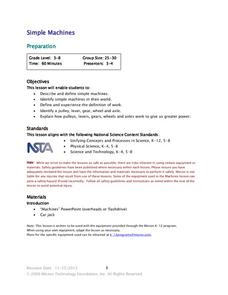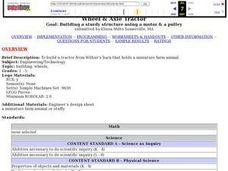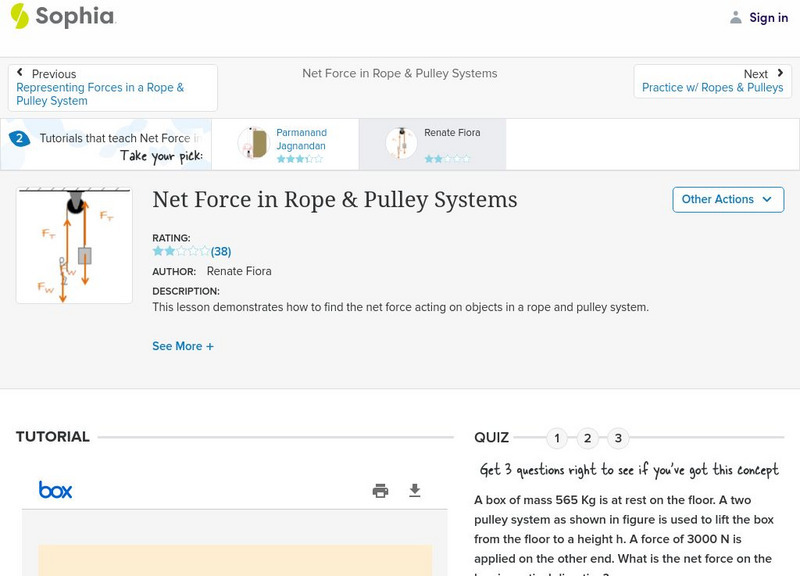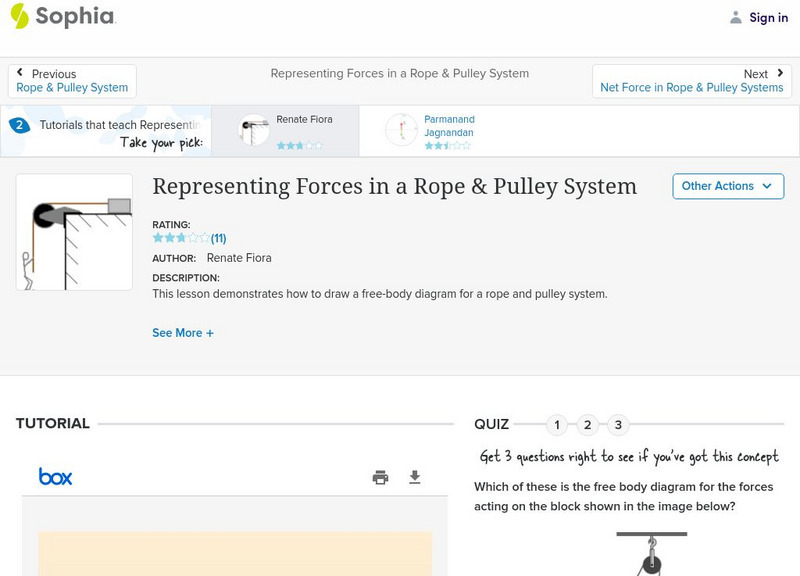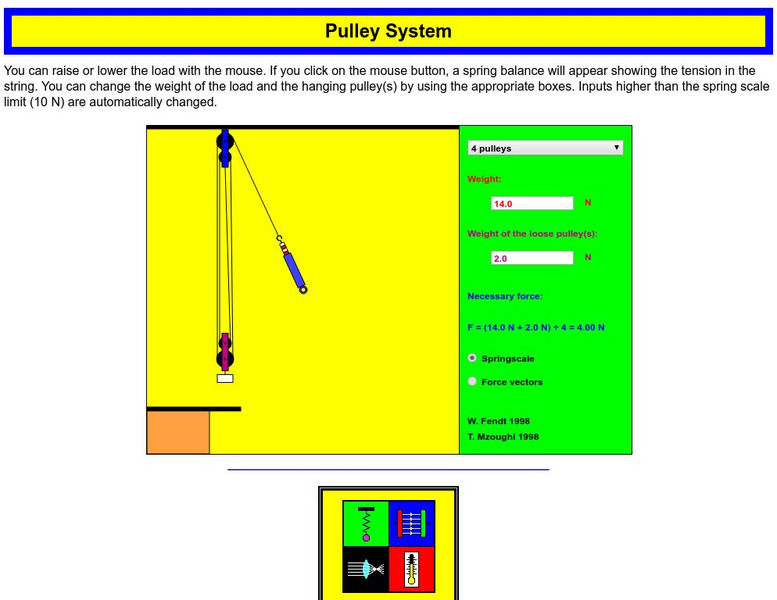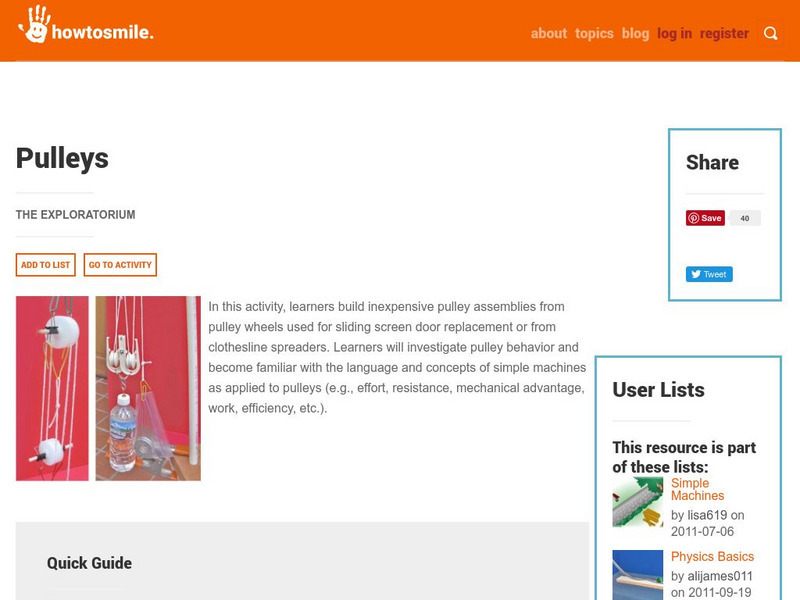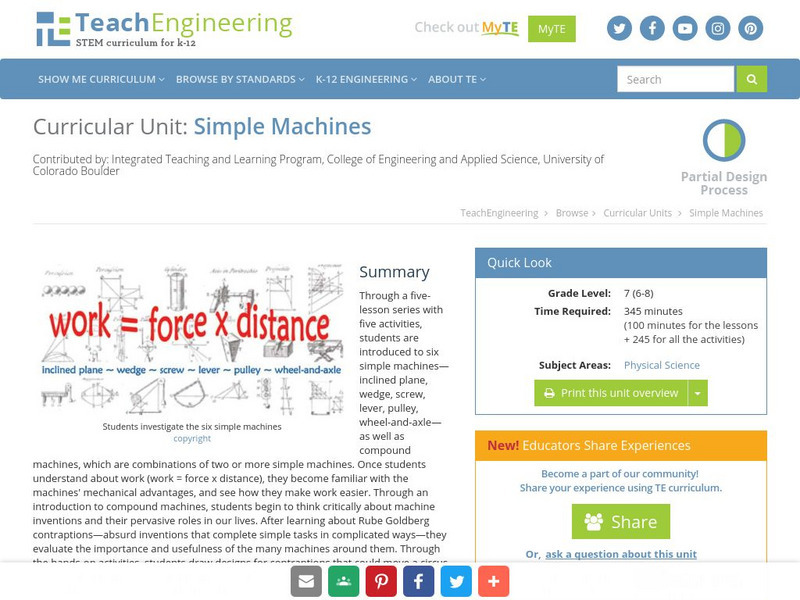Curated OER
Simple Machines
Fourth graders choose a simple machine and write about they way they believe it will work. Students experiment, write down procedures used and record observations. They will find a picture of the machine and add it to their report.
Curated OER
Block and Tackle
Students simulate block and tackles to lift heavy objects. They lift cargo by hand with the whip and the two-fold purchase to simujlate what crew members do aboard ships. They measure the effort and distance pulled for a gun tackle, luff...
Curated OER
Wheel & Axle Tractor
Students design and build a tractor using LEGO materials. They write and draw their designs.
Science Struck
Science Struck: Simple Machines: Pulley Systems
Describes some history of the pulley, how it works, the formula for calculating its mechanical advantage, types of pulley systems, and some applications of pulleys.
Science Struck
Science Struck: Examples of Pulleys in Daily Life
Learn how pulleys work and their many uses in everyday life, industry, recreation, and other activities. Includes many pictures of pulleys and pulley systems.
Other
New Path Learning: Virtual Lab: Exploring Pulleys
Investigate how changing the load, number of pulleys, and the size of the person affect the function of a pulley system. Students can record their observations on a data table.
Sophia Learning
Sophia: Forces in a Rope & Pulley System: Lesson 2
This lesson explains what forces are acting on objects which are at rest or moving in a rope and pulley system. It is 2 of 2 in the series titled "Forces in a Rope & Pulley System."
Sophia Learning
Sophia: Net Force in Rope & Pulley Systems: Lesson 2
This lesson demonstrates how to find the net force acting on objects in a rope and pulley system. It is 2 of 2 in the series titled "Net Force in Rope & Pulley Systems."
Sophia Learning
Sophia: Net Force in Rope & Pulley Systems: Lesson 1
This lesson demonstrates how to find the net force acting on objects in a rope and pulley system. It is 1 of 2 in the series titled "Net Force in Rope & Pulley Systems."
Sophia Learning
Sophia: Representing Forces in a Rope & Pulley System: Lesson 2
This lesson demonstrates how to draw a free-body diagram for a rope and pulley system. It is 2 of 2 in the series titled "Representing Forces in a Rope & Pulley System."
TeachEngineering
Teach Engineering: Machines and Tools, Part Ii
In this activity, students gain first-hand experience with the mechanical advantage of pulleys. Students are given the challenge of helping save a whale by moving it from an aquarium back to its natural habitat into the ocean. They set...
Walter Fendt
Walter Fendt: Pulley System
An interactive activity which demonstrates systems of two, four. and six pulleys.
TeachEngineering
Teach Engineering: Powerful Pulleys
Young scholars continue to explore the story of building a pyramid, learning about the simple machine called a pulley. They learn how a pulley can be used to change the direction of applied forces and move/lift extremely heavy objects,...
Other
How to smile.org: Building Pulleys
An activity where young scholars use pulley systems to pick up a paint can and move an eraser from the ground to the top of a desk. After completing this activity, students will understand how pulley systems can help us do work.
Integrated Publishing
Integrated Publishing: Pulley Mechanical Advantage
Good illustrations and explanations for finding the mechanical advantage of pulley systems.
Sophia Learning
Sophia: Practice W/ Ropes & Pulleys: Lesson 2
This lesson provides the learner with an example problem on determining the net force acting on objects within a rope and pulley system. It is 2 of 2 in the series titled "Practice w/ Ropes & Pulleys."
Creative Science Centre
Creative Science Centre: Home Made Pulleys
Instructions for making pulleys at home.
TryEngineering
Try Engineering: Pulleys and Force
Students work in teams to learn how pulleys and pulley systems impact everyday life. This activity explores the concept of force and shows how the use of pulleys can greatly reduce required force.
Sophia Learning
Sophia: Simple Machines: Pulley: Lesson 2
This lesson will explain how to calculate the mechanical advantage of a pulley system. It is 2 of 3 in the series titled "Simple Machines: Pulley."
Sophia Learning
Sophia: Simple Machines: Pulley: Lesson 3
This lesson will explain how to calculate the mechanical advantage of a pulley system. It is 3 of 3 in the series titled "Simple Machines: Pulley."
Other
Colts Neck Township Schools: Hands on Technology: Marvelous Machines: Pulleys 2
Student handout for conducting an experiment in using one pulley or two pulleys to lift a load.
Ohio State University
Ohio State Univ.: Simple Machines & Mechanical Advantage [Pdf]
This site details how simple machines create a mechanical advantage for humans. Levers, theoretical mechanical advantage, actual mechanical advantage, and pulley systems are discussed.
Walter Fendt
Walter Fendt: Sistema De Poleas
This site is an interactive applet using the principles of a pulley system. The number of pulleys can be varied as well as the load lifted
TeachEngineering
Teach Engineering: Simple Machines
Through a five-lesson series with five hands-on activities, students are introduced to six simple machines - inclined plane, wedge, screw, lever, pulley, wheel-and-axle - as well as compound machines, which are combinations of two or...
Other popular searches
- Double Pulley System
- Pulley System Electric Motor
- Triple Pulley System
- Combined Pulley System
- Pictures of Pulley Systems
- Pulley System and Advantage
